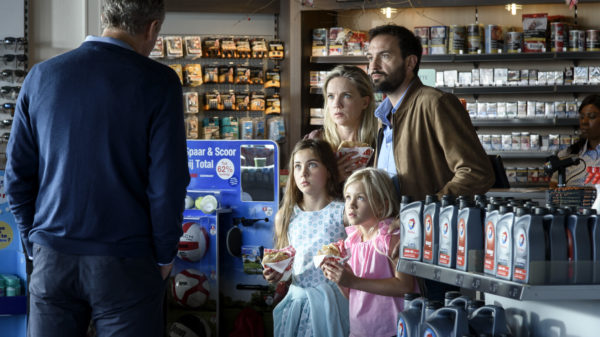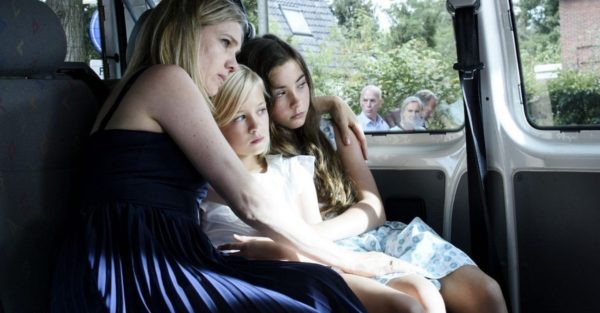
What happens when a hot-headed family man pisses off the wrong rule-abiding driver on the highway?
Road rage and toxic masculinity are the taste of the day in Tailgate / Bumperkleef, a thriller from the Netherlands about a family who run afoul of a driver who happens to be a killer. It’s a relatively simple concept executed to outstanding effect, in no small part because writer/director Lodewijk Crijns expertly crafts tense and exciting set pieces.
Hans (Jeroen Spitzenberger) is a quick to anger man attempting to corral his wife and two daughters onto the road. The uncomfortable family dynamic is immediately introduced as Hans gripes that wife Diana (Anniek Pheifer) is taking too long, even going so far as to undercut her in front of their daughters, Milou (Roosmarijn van der Heok) and Robine (Liz Vergeer).
Desperate to make up for lost time on the busy highway, Hans speeds and eventually tailgates a white van that is doing the exact speed limit. Naturally Hans thinks nothing of laying on the honk and staring down the driver when he has the opportunity to pass, which escalates tensions further when the man (Willem de Wolf) confronts him at a gas station, demanding an apology. Unbridled hostility spills over into outright violence shortly thereafter as the family becomes the prey of the man, who, unbeknownst to them, is a serial killer who appears to target unruly drivers and cyclists who don’t follow the rules of the road.
Tailgate is divided into two halves: the inciting incident on the highway, followed by an extreme (and extended) bout of road rage. Then there’s a cool-down period as Crijns resets the board for a second round that moves the confrontation to a more domestic setting. Particularly in the driving sequences, Crijns keeps the direction tight, emphasizing the sense of claustrophobia and skyrocketing panic among the family members.
The shift from cars to home invasion in the latter half of the film is one of several elements that distinguish Tailgate from other driving-centric thrillers like Duel, Road Games, or Joyride. The film doesn’t take place exclusively on the road or in cars; this winds up being a smart decision because the narrative doesn’t need to adopt unconvincing scenarios to keep characters behind the wheel. The family pulls over, they flee into woods, they hide in houses and they involve the police.

The presentation of the family is the other major deviation that Tailgate makes. While the protagonists of road rage films do tend to instigate the conflict with an ill-conceived prank or some other bad behaviour, they’re typically depicted as generally good people who don’t deserve the level of wrath heaped upon them by an evil, vengeful villain.
Tailgate, on the other hand, has the gall to present its protagonists as extremely unlikeable and unsympathetic. Hans is by far the worst: he’s angry, he’s prone to yelling at his wife and daughters and his stubborn refusal to acknowledge when he’s made a mistake is, in large part, the reason why the family is targeted.
Unlike American films, Diana isn’t any better. She’s shrill, passive-aggressive and far too ready to make excuses for the couple’s spoiled, bratty daughters. Diana and Hans’ relationship is unsupportive and consists of bitchy comments that frequently veer over into full-on contempt. In short: his family is horrendous.
Which only makes Tailgate more fascinating because as an audience it can be difficult to find sympathy for these excruciating individuals. And yet, their abhorrent behaviour shouldn’t doom them to die at the hands of a killer who demands citizens abide by the law of the land or perish at the hands of his pressurized poison spray. It makes for some tantalizing moral quandaries amidst the high octane chase scenes and combative fight scenes and guarantees that Tailgate is never boring. 4/5
Tailgate/ Bumperkleef played at the 2021 North Bend Film Festival.
